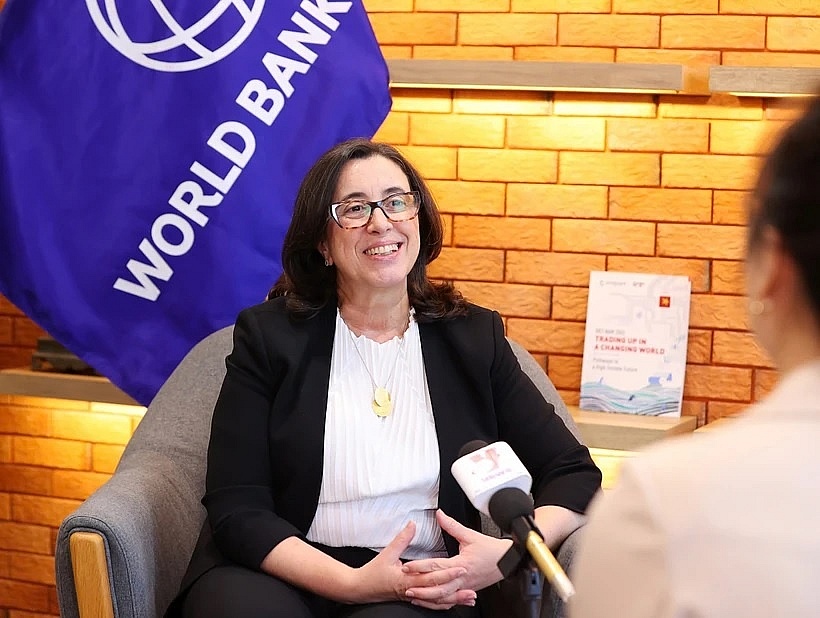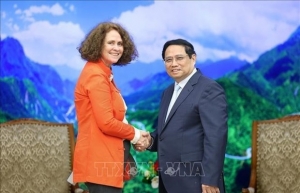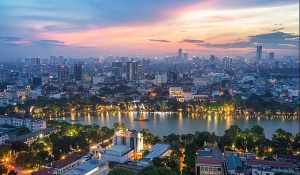Vietnam - a success story in development path: WB Vice President
 |
| WB Vice President for East Asia and the Pacific Manuela V. Ferro (Photo: VNA) |
She made the statement during an exclusive interview with the Vietnam News Agency on November 21.
Vietnam experienced remarkable growth and poverty reduction over the past decades. What were the key factors in this rapid transformation?
Vietnam's development journey is a remarkable success story. Family incomes increased sixfold in 40 years, nearly eradicating extreme poverty. Vietnam stands as a dynamic, modern economy that has attracted major foreign investment.
The resilience and determination of its people played a critical role. A key turning point was the Government's bold move in the 1980s to open up the economy and prioritise exports. Today, exports contribute about half the GDP, and one in every two workers works in the export sector.
One key factor in Vietnam’s growth so far is the abundant and low-cost labour force and a second element is low energy costs. These factors not only translated into growth and higher incomes but also drove a significant share of the labour force engaged in low value-added activities like final assembly and a high carbon intensity of GDP.
Vietnam has set the ambitious goal of becoming a high-income country by 2045. What is needed to achieve this target and how can the WB contribute?
To achieve its goal of becoming a high-income country by 2045, Vietnam must focus on moving up the value chain and integrate domestic firms with productive foreign firms. The service sector has the potential to serve as an additional engine of growth, especially if it is open to investment and greater competition.
Decarbonisation will be crucial, especially in the energy sector, to enhance competitiveness and reduce the carbon footprint of GDP. Investing in a higher skilled labour force, particularly in engineering and other STEM fields, will be critical to protect jobs from automation and drive production to higher value-added activities.
The WB’s report "Vietnam 2045: Trading Up in a Changing World – Pathways to a High-Income Future" outlines strategic choices and pathways. The Government's openness to future planning is a positive sign, and we are optimistic about Vietnam's prospects.
We have partnered with Vietnam since 1978, first through the WB’s fund for the poorest countries, International Development Assistance (IDA). We are proud to have supported Vietnam from post-war recovery to today's middle-income status, with investments in education and critical infrastructure, but also with policy advice that helped generate greater economic dynamism and jobs.
Vietnam is now at a different stage of development. The external and domestic context have changed. They require proactive and agile policy making and investments into Vietnam’s new economy. From the WB’s side, we are ready to finance transformative investments in transport, digitalisation, climate resilience and agricultural productivity that can help Vietnam achieve its goal of achieving high-income status in 2045.
During your visit, you went to the Mekong Delta to speak to farmers and agribusinesses that have benefitted from the WB - financed Vietnam Sustainable Agriculture Transformation Project. What did you see there?
During my visit, I saw how Mekong Delta farmers adopted an innovative package of agricultural technologies that are revolutionising rice farming. This method increases yields, reduces pesticide and fertiliser use, and boosts farmer incomes by up to 30%. The method also cuts methane emissions, a significant contributor to climate change. Investments to modern irrigation also allow for growing additional crops, some for export, and generating additional sources of income.
I heard from farmers, cooperatives and agribusinesses how enthusiastic they were about expanding their operations. We are keen to help expand this approach aims to 1 million hectares, which the Prime Minister announced. Vietnam's leadership in agricultural innovation is remarkable and is being copied elsewhere.
The Vietnamese Government has made efforts to decarbonize not only the agriculture sector, but also the whole economy. So what do you think about these efforts?
The energy sector is a major source of CO2 emissions in Vietnam. Decarbonising it while keeping costs low is essential. As global markets begin to favour clean energy-produced goods over those from dirty energy, Vietnam's large export sector needs to adapt. The country should cleaning up transport and agriculture, especially rice cultivation and livestock.
Climate change already affects Vietnam, with salinisation, more frequent floods, and coastal destruction. Continued growth must align with climate-friendly technologies to meet Vietnam’s ambitious targets.
The WB fund for the poorest, IDA, will be replenished in the Republic of Korea (RoK) in two weeks. How did Vietnam benefit from IDA and what can other developing countries learn from Vietnam’s trajectory?
Yes, the RoK is hosting the 21st replenishment of IDA in early December. The country’s development experience shows what is possible, with proactive and visionary development policy, and the support for external partners like IDA. There are some parallels between the RoK and Vietnam, with both countries rising from post-war devastation to rapid growth.
Every three years, we replenish IDA to support the poorest countries in the world with low-interest and long maturity loans. The RoK, grateful for IDA's role in its development, is hosting this round and has already announced a 45% increase in its contribution to IDA. Vietnam too has wisely used 18 billion USD from IDA over several decades. Many countries in this region and across the globe still need IDA support.
What is the message you would like to say to the Vietnamese audience?
It is inspiring to witness the determination and strength of the Vietnamese people. Contributing to your nation's progress is not just a pleasure, but a privilege, and we are keen to help you achieve high income status by 2045.
Thank you!
 | PM receives outgoing WB Country Director Prime Minister Pham Minh Chinh on March 28 hosted a reception for World Bank (WB) Country Director for Vietnam Carolyn Turk, who came to say goodbye at the end of her tenure. |
 | World Bank forecasts Vietnam’s economy to grow by 6.1 per cent in 2024 Vietnam’s economy is forecast to grow by 6.1 per cent in 2024, rising to 6.5 per cent in 2025–2026, according to a report by the World Bank issued on August 26. |
What the stars mean:
★ Poor ★ ★ Promising ★★★ Good ★★★★ Very good ★★★★★ Exceptional
Related Contents
Latest News
More News
- Private capital funds as cornerstone of IFC plans (February 20, 2026 | 14:38)
- Priorities for building credibility and momentum within Vietnamese IFCs (February 20, 2026 | 14:29)
- How Hong Kong can bridge critical financial centre gaps (February 20, 2026 | 14:22)
- All global experiences useful for Vietnam’s international financial hub (February 20, 2026 | 14:16)
- Raised ties reaffirm strategic trust (February 20, 2026 | 14:06)
- Sustained growth can translate into income gains (February 19, 2026 | 18:55)
- The vision to maintain a stable monetary policy (February 19, 2026 | 08:50)
- Banking sector faces data governance hurdles in AI transition (February 19, 2026 | 08:00)
- AI leading to shift in banking roles (February 18, 2026 | 19:54)
- Digital banking enters season of transformation (February 16, 2026 | 09:00)

 Tag:
Tag:



















 Mobile Version
Mobile Version